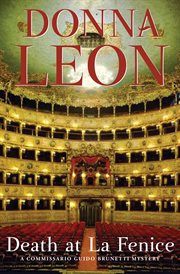Death at La Fenice Chapter One The third gong, announcing that the opera was about to continue, sounded discreetly through the lobbies and bars of Teatro La Fenice. In response, the audience stabbed, out cigarettes, finished drinks and conversations, and started to filter back into the theater. The hall, brightly lit between acts, hummed with the talk of those returning to their seats. Here a jewel flashed, there a mink cape was adjusted over a naked shoulder or an infinitesimal speck of dust was flicked from a satin lapel. The upper galleries filled up first, followed by the orchestra seats and then the three rows of boxes. The lights dimmed, the hall grew dark, and the tension created by an ongoing performance mounted as the audience waited for the conductor to reappear on the podium. Slowly the hum of voices faded, the members of the orchestra stopped fidgeting in their seats, and the universal silence announced everyone's readiness for the third and final act. The silence lengthened, grew heavy. From the first gallery, there came a burst of coughing; someone dropped a book, perhaps a purse; but the door to the corridor behind the orchestra pit remained dosed. The first to talk were the players in the orchestra. A second violinist leaned over to the woman next to him and asked if she had made her vacation plans. In the second row, a bassoonist told an oboist that the Benetton sales were starting next day. The people in the first tiers of boxes, who could best see the musicians, soon imitated their soft chatter. The galleries joined in, and then those in orchestra seats, as though the wealthy would be the last to give in to this sort of behavior. The hum grew to a murmur. Minutes passed. Suddenly the folds of the dense green velvet curtain were pulled back and Amadeo Fasini, the theater's artistic director, stepped awkwardly through the narrow opening. The technician the light box above the second gallery, with on, decided to center a hot on the man at center stage Blinded, Fasini shot up his a arm to shield his eyes. Still holding his arm raised in front of him, as if to protect himself from a blow, he began to speak: "Ladies and gentlemen,"and then he stopped, gesturing wildly with his left hand to the technician, who, realizing his error, switched off the light. Released from his temporary blindness, the man onthe stage started again. "Ladies and gentlemen, I regret toinform you that Maestro Wellauer is unable to performance." Whispers, questions, rose from the audience, silk rustled as heads turned, but he continued to speak above the noise. "His place will be taken by Maestro Longhi." Before the hum could rise to drown him out, he asked, voice insistently calm,"Is there a doctor in the audience?" His question met a long pause, then people began to look around them: who would be the one to present himself? Almost a full minute passed. Finally, a hand rose slowly in one of the first rows of the orchestra, and a woman got out of her seat. Fasini waved a hand to one of the uniformed ushers at the back of the house, and the young man hurried to the end, of the row where the woman now stood. "If you would, Dottoressa," Fasini said, sounding as if he were in pain and needed the doctor for himself, "Please go backstage with the usher." He glanced up into the horseshoe of the still darkened hall, tried to smile, failed, and abandoned the attempt. "Excuse, ladies and, gentlemen, the difficulty. The opera will now continue." Turning, the artistic director fumbled at the curtain, unable for a moment to find the opening through which he had come. Disembodied hands parted the curtain from behind, and he slipped through, finding himself in the bare garret where Violetta was soon to die. From out in front, he heard the tentative. applause that greeted the substitute conductor as he took his place on the podium. Singers, chorus members, stagehands appeared from all around him, as curious as the audience had been but far more vocal. Though the power of his position usually protected him from contact with members of the company as low in standing as these, the director could not now avoid them, their questions, their whispers. "It's nothing, nothing," he said to no one in particular, then he waved at them all, trying to clear them, with that gesture, from the stage upon which they flocked. The music of the prelude was drawing to a close; soon the curtain would open on the evening's Violetta, who now sat nervously on the edge of the cot at the center of the stage. Fasini redoubled the intensity of his gestures, and singers and stagehands began to move off to the wings, where they continued to whisper among themselves. He snarled a furious "Silenzio" and waited for it to take effect. When he saw the curtains inching apart to reveal the stage, he hurried to join the stage manager, who stood off to stage right, beside the doctor. A short, dark woman, she stood directly under a No Smoking sign, with an unlighted cigarette in, her hand. "Good evening, Doctor," Fasini said, forcing himself to smile. She dropped the cigarette into the pocket of herjacket and shook his hand. "What is it?" she finally asked as, from behind them, Violetta began to read the letter from Germont pére. Fasini rubbed his hands together briskly, as if the gesture would help him decide what to say. "Maestro Wellauer has been . . . " he began, but he found no satisfactory way to finish the sentence. "Is he sick?" asked the doctor impatiently. "No, no, he's not sick," Fasini said, and then words left him. He returned to rubbing his hands together. "Perhaps I had better see him," she said, making it a question. "Is he here in the theater?" Death at La Fenice . Copyright © by Donna Leon. Reprinted by permission of HarperCollins Publishers, Inc. All rights reserved. Available now wherever books are sold. Excerpted from Death at la Fenice by Donna Leon All rights reserved by the original copyright owners. Excerpts are provided for display purposes only and may not be reproduced, reprinted or distributed without the written permission of the publisher.



